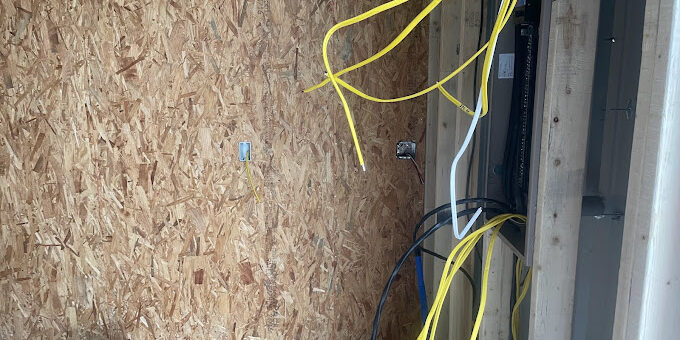For homeowners in Wylie, TX, ensuring your electrical wiring is safe and up to date is essential—not only for your property’s value but also for your family’s safety. As time passes, homes with outdated or deteriorating wiring systems can experience a wide range of problems, including electrical fires, short circuits, or energy inefficiency. If you’ve been noticing flickering lights, outlets that don’t work, or burning smells, your electrical system may be signaling that it’s time for an upgrade.
Electrical issues are not something to take lightly. According to this overview of electricians, the work involved requires skilled training and adherence to safety protocols. This is why working with a licensed team like JME Electric Group can make all the difference. We provide compassionate service backed by years of experience, making us a reliable partner in safeguarding your home.
Key Takeaway:
If your home is experiencing frequent electrical problems or was built more than 30 years ago, it’s time to assess your wiring system. Electrical wiring doesn’t last forever, and ignoring the warning signs can lead to costly and dangerous outcomes.
Warning Signs of Outdated or Faulty Wiring
Flickering or Dimming Lights Throughout the Home
One of the first signs that your wiring may be deteriorating is when lights begin to flicker or dim—especially when using appliances. This symptom is often caused by voltage fluctuations, a clear indicator that the wires behind your walls may be damaged or too weak to handle modern electrical demands.
Frequently Tripped Circuit Breakers
If your circuit breakers are constantly tripping, your electrical system may be overloaded. Older wiring systems simply weren’t designed for today’s energy consumption. These interruptions aren’t just frustrating—they can be signs of bigger issues behind the scenes.
Discolored Outlets or a Burning Smell
Discoloration around outlets or a faint burning odor are urgent red flags. These often point to overheating wires or arcing, both of which can lead to dangerous electrical fires. If this occurs, it’s vital to seek immediate assistance from an experienced electrical contractor before further damage occurs.
The Age of Your Home Matters More Than You Think
Homes Built Before the 1980s
Many older homes in Wylie still have aluminum wiring, which was commonly used in the 1960s and 1970s. Unfortunately, aluminum wiring has proven less stable and more prone to loosening over time compared to copper. If your home falls in this category, a full inspection is crucial.
Knob-and-Tube Wiring in Historic Properties
Some historic properties may still use knob-and-tube wiring, a system long since outdated. While it might seem functional on the surface, it lacks grounding and insulation—two vital components of modern safety standards. Replacing it isn’t just an upgrade—it’s a necessity.
Renovations Without Electrical Upgrades
Home repairs and remodels may enhance aesthetics, but if the electrical system wasn’t updated alongside, problems may lie beneath. To ensure your upgrades are built on a safe foundation, always consult professionals like JME Electric Group, who understand the full picture.
Warning Signs Inside the Walls
Warm or Vibrating Wall Plates
When you touch your light switches or outlets, they should never feel warm. A warm wall plate can be a serious sign that your wiring is overloaded, improperly installed, or fraying behind the scenes.
Buzzing or Crackling Sounds
If you hear any buzzing, popping, or crackling sounds from outlets or walls, take immediate action. These are often symptoms of live wires coming into improper contact or connections starting to fail—conditions that can lead to sudden electrical fires.
Rodent Damage in Hidden Areas
Wiring hidden in crawlspaces, attics, or basements is vulnerable to rodent damage. Chewed wires or gnawed insulation is more than a pest issue—it’s a fire hazard. If you suspect this, a thorough inspection is necessary.
Practical Ways to Evaluate Your Wiring
Routine Home Electrical Inspections
Having your wiring inspected regularly by a licensed electrician ensures small problems don’t become larger ones. For homeowners in Wylie, you can review our past electrical projects to understand how we’ve helped others stay safe.
Upgrade for Today’s Power Usage
Today’s homes depend heavily on electricity—from smart appliances to EV chargers. If your home still relies on an outdated panel, it may not be up to the task. Upgrading wiring is not just about fixing—it’s about future-proofing your home.
Safe Outlets for Wet Areas
Outlets near sinks or outdoor areas should always be GFCI protected. If your home lacks these, the wiring may not meet modern codes. GFCI outlets help prevent shocks and are essential for households with children or pets.
Benefits of a Full Electrical Rewire
Improved Fire Safety
Rewiring your home significantly reduces the risk of electrical fires. This alone makes it a worthwhile investment, especially for families looking to create a safe environment.
Increased Property Value
Modern wiring is a strong selling point for future buyers. It shows the home is up to code and prepared for modern living. It’s an investment that pays off in both safety and resale value.
Confidence in Your Power Supply
You shouldn’t have to worry every time you flip a switch. With a complete rewire, you can rest easy knowing your home’s electrical system is stable, safe, and reliable.
Answering Common Questions
How often should I check my home’s electrical wiring?
Experts recommend having your home inspected every 10 years—or sooner if you notice warning signs like flickering lights or tripped breakers.
Can I replace old wiring myself?
It is strongly advised not to attempt this yourself. Electrical work is highly technical and dangerous without proper training. Always hire a licensed electrician to ensure the job is done safely.
What if only one outlet isn’t working?
A single malfunctioning outlet may point to a loose wire or a tripped GFCI, but it can also be a sign of bigger issues. If outlets frequently stop working, a professional inspection is warranted.
The Influence of Electrical Codes and Regulations
Modern building codes are constantly evolving. Wiring that was considered safe 20 years ago may no longer meet today’s standards. Understanding these changes can help you determine if your system is outdated and in need of replacement.








